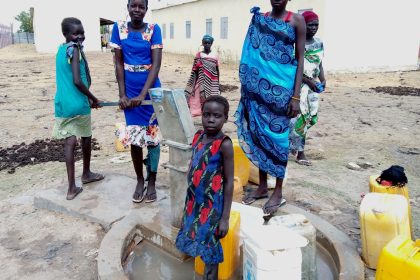Plans for new hospital for wealthy Ugandans draws growing anger
 Critics have raised the point that the government is taking on all the risk of the PPP project while FINANSI’ financial exposure is minimal.
Critics have raised the point that the government is taking on all the risk of the PPP project while FINANSI’ financial exposure is minimal.
March 27—Controversy is gaining momentum over a government plan to build a $370 million high-profile specialist hospital that will basically cater for senior public officials and the affluent. Calls for a transparent new cost-benefit analysis have been made on top of suggestions that the whole thing be cancelled altogether.
Italian firm, FINASI fronted by Enrica Penetti, is behind the venture first mooted about six years ago. President Yoweri Museveni has already given his backing for the project to be located at Lubowa on the outskirts of central Kampala. Little is known locally about the company which has only deepened the suspicion surrounding the project. But FINASI started in 1969 as a mainly trading company in Milan, Italy and today prides itself as ‘global turnkey provider for heathcare facilities’.
Earlier this year, Parliament approved the issuing of promissory Notes worth $379.7 million, (about UGX1.3 trillion) to pay for the design, construction and equipping of the proposed International Specialised Hospital of Uganda (ISHU). According to the terms of a December 2018 agreement, Roko Construction has been earmarked to build the facility.
Museveni reasons that savings will be made in the current expenditure, (close to $200 million annually) used for ferrying senior government officials abroad for medical care. It took a presidential directive to hive off some land formerly allocated to the Joint Clinical Research Centre (famous for HIV/AIDS field studies).
Five years ago, Museveni said, “I requested them (FINASI) to come to Uganda to deal with kidney and heart problems so that people stop travelling to India for treatment.”
At the groundbreaking ceremony in mid-2017 and officiated by Museveni, health minister, Dr. Jane Ruth Aceng said, “The proprietor, FINASI, will run the facility for a period of 10 years, they will be responsible for the human resources, the treatment of patients and the maintenance after 10 years, the hospital reverts back to government.”
However a cross section of the medical fraternity and civil society in general are highly critical. They term the venture a waste of public resources in the midst of other pressing and basic needs in the national health infrastructure. They point out that Uganda’s cancer and heart institutes continue to be beset by chronic underfunding which has impeded services.
On Tuesday this week, leading local CSOs, including SEATINI, Uganda Debt Network and CSBAG held a town meeting with the help of Oxfam to thrash out the issue.
Africa Kizza, a Program officer with the Southern and Eastern Africa Trade Information and Negotiations Institute (SEATINI) said in a joint statement,
“Given the concerns of value for money, the already existing health sectors challenges and the country’s current economic situation, pursuing this agreement will leave the country in more macroeconomic instability and more indebtedness.”
Critics have also raised the point that the government is taking on all the risk of the project while FINASI’ financial exposure is minimal. ‘This is contrary to Article 3 (a) of the Public-Private Partnership Act 2015 which calls for ensuring value for money, by optional allocation of risks to the private parties and maximization of the benefits to be obtained from expertise and financing by private parties,’ the statement reads in part.
Kizza said, “From our analysis, this new facility will have very little positive impact to the health sector. It will actually worsen the health sector financing which is already not enough for the already existing public hospitals.”

 African Heads of state head to South Korea next week for Summit talks
African Heads of state head to South Korea next week for Summit talks
 Trading leads as main source of income for Ugandans
Trading leads as main source of income for Ugandans
 New leadership for bankers’ umbrella as total assets top $12 billion
New leadership for bankers’ umbrella as total assets top $12 billion
 Uganda-Tanzania announce date for second joint business forum
Uganda-Tanzania announce date for second joint business forum
 Unpacking results-based financing: balancing strengths with weaknesses
Unpacking results-based financing: balancing strengths with weaknesses
 Big fish in small pond Stanbic notches up $100m profit for 2023 topping previous figure by 15%
Big fish in small pond Stanbic notches up $100m profit for 2023 topping previous figure by 15%
